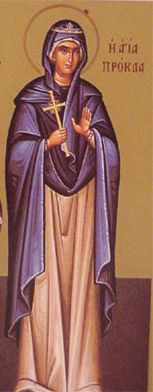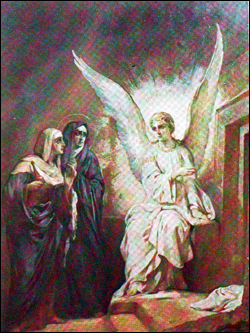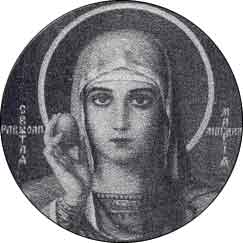This courage was exhibited by Saint Procla to an even greater degree afterwards, when her dream was fulfilled in reality, and she suffered for Christ among the countless hosts of martyrs, entering through the door of martyrdom into the everlasting joy of the Kingdom of God.
In our present times, when a multitude of Pontius Pilates and a multitude of cunning Judases betray the innocent and wash their hands of them, have the possibility to save people and do not save them, it is timely for us to remember Saint Procla over and over again, with her attempt, though unsuccessful on earth, but crowned in heaven, to defend the Lord Who was on His way to voluntary passion for the sake of our salvation.
The passive and masked guilt of Pilate does not leap to the eye as much as does the iniquity of Annas and Caiaphas, of Judas and the false witnesses. But in essence it is heavy, and in our times the entire onus, the entire insufferableness of it for its victims, the agony of this crime was experienced by millions of Orthodox Russian people, whom in front of our eyes new Judases betrayed to new crucifiers, with the permissiveness and indifference of new Pilates, who could and should have saved the victims, but did not, fearing repercussions for themselves.

Just as Pilate, upon hearing that Christ came from Galilee, quickly tried to pass his responsibility for this innocent blood onto Herod, and later delivered Him up to crucifixion, so have contemporary rulers passed their responsibility for the fates of people, among whom each was the image of God and co-sufferer of Christ, from one person to another, and finally delivered them to execution.
In vain were these attempts to slough off responsibility. Even if Herod had not rejected the responsibility, even if he had taken it on, even if he and not Pilate had condemned Christ – the Roman proconsul Pontius Pilate would still have entered history as the image, even though less clear and not so well-defined, of fainthearted and cowardly avoidance of duty and of the betrayal of Absolute Truth.
“And Pilate gave sentence that it should be as they required. And he released unto them him that for sedition and murder was cast into prison, whom they had desired; but he delivered Jesus to their will. And as they led Him away, there followed Him a great company of people, and of women, which also bewailed and lamented Him. But Jesus turning unto them said: “Daughters of Jerusalem, weep not for Me, but weep for yourselves, and for your children. For, behold, the days are coming, in the which they shall say: blessed are the barren, and the wombs that never bare, and the paps which never gave suck. Then shall they begin to say to the mountains: fall on us; and to the hills: cover us. For if they do these things with a green tree, what shall be done with a dry?” (Luke 23:24-31).
The men cried: “Crucify, crucify Him,” the soldiers beat Him, spat on Him, humiliated Him, while the women wept and lamented over Him.
This moment is tied in with the ancient tradition, widespread in the West and thus accepted more by the Roman Catholic world than the Orthodox world, but relating to olden pre-division times, that Saint Veronica gave Christ a towel to wipe His face, bloodied by the crown of thorns, humiliated by spitting, covered with the sweat of His terrible agony. According to Western tradition Veronica was a relative of King Herod, while Eastern tradition holds that she was the woman whose flow of blood was stopped after she touched Christ. She may very well have been both. From the Gospel we know that the bleeding woman was very rich: for eighteen years she was treated in vain by many different doctors, until a single touch of Christ’s robe healed her.
If Western tradition is correct, we once again see the striking contrast in the attitude towards Christ on the part of the shallow and insignificant King Herod and his relative Veronica. Out of boredom and sheer idleness the king wished to see Christ, because he had heard a great deal about Him and hoped to see some kind of miracle from Him, but being afterwards disappointed in this regard, “Herod with his soldiers, having humiliated Him and mocked Him, arrayed Him in a gorgeous robe and sent Him back to Pilate” (Luke 23:11). Thus Herod also basely added new thorns to Christ’s thorny crown.

But Veronica goes out into the dusty road to Jerusalem in the heat of midday, mingles with the crowd of the women of Jerusalem, weeps together with them, hears Christ’s ominous words, and serves Him as best she can by giving Him a towel on which He imprints the image of His face.
In many respects Christ’s words have now come to pass in our terrible times for our ill-fated generation: millions of people were ready to cry out to the mountains: fall down upon us, and to the hills: cover us, “for the great day of His wrath is come, and who shall be able to stand?” (Rev. 6:17).
From the heavens – in which for all the thousands of years of his existence man was accustomed to see such a beautiful world of stars attesting to the infinite wisdom of God, from which the singing of angels was once heard, toward which man was used to lift his gaze in prayer – from these heavens we have seen a fiery rain of burning phosphorus and weapons of human malevolence and destruction rush down upon us. In such moments did we not pray to the mountains and the hills to cover us? But we may expect even worse things in the future. Let us note that this horror has not been initiated or implemented by women. The only thing left for them was to weep, to weep with bitter tears of suffering for their fathers, husbands, brothers, and sons, and to fall together with them as defenseless victims of the modern insane world. The earth has been completely saturated not only with blood, but also with tears, tears more corrosive than blood… And if there has been more blood shed by men, there have been countless more tears shed by women.
We stand at the Cross… All have run away, even the more daring ones… The best of the best, the select among the select, those who from out of all mankind the Lord had chosen to be His companions, His friends, His disciples, whose feet He had washed, to whom He had said: “Ye are My friends. Henceforth I call you not servants, for the servant knoweth not what his lord doeth, but I have called you friend, for all things that I have heard of My Father I have made known unto you” (John 15:14-15) – they, too, ran away, while the most active, fiery, and decisive one among them, the one who always represented the disciples, who spoke and acted on their behalf – he renounced Christ and swore that he “did not know this Man” (Matt. 26:72).
But did everyone, did all of mankind renounce Him and run away at that terrible moment?
No: “Now there stood by the cross of Jesus His Mother, and His Mother’s sister, Mary the wife of Cleophas, and Mary Magdalene” (John 19:25). And Apostle Matthew adds: “And many women were there beholding afar off, which followed Jesus from Galilee, ministering unto Him” (27:55).
There was one apostle, apparently the youngest and most beloved of Christ’s disciples – John, but he did not represent here the synaxis of the apostles, as he had done together with Peter and James on the mountain of the Transfiguration, in the chamber where the daughter of Jairus was resurrected, or in the garden of Gethsemane. Here he separated himself from the frightened and fleeing fellow-disciples, but having separated himself, and moved by boundless love for the Saviour, which brought him to the cross, he now came to represent not only the apostles, but all of mankind when he heard from Christ’s lips the words: “Here is thy Mother,” and thus became the adopted son of the Most-holy and Most-blessed Virgin Mary, together with himself affiliating to Her all the believers in Her Son.
We will not speak here of Her, the Mother of God and the Mother of all Christians, because even the best representatives of the female gender cannot be mentioned in the same breath as Her most-holy name. We will simply note that through Her the female nature that up to that time had been so despised and humiliated in the ancient pagan world was now elevated to the highest possible level. She, our Most-blessed Intercessor, stands at the right side of God’s throne in untiring prayer for the world.
And here on earth, in the holy city of Jerusalem, at the sacred and awesome mount of Golgotha, a site fenced off with a silver grate causes every Christian heart to tremble: according to tradition this is the site where the Mother of God stood during the Saviour’s agonies on the cross, gazing upon them and sharing them with Her maternal heart in fulfillment of Simeon’s prophetic words: “Yea, a sword shall pierce through Thy own soul also” (Luke 2:35).
The Lord is generous and all-merciful. He rewards those who serve Him with “a good measure, pressed down, and shaken together, and running over” (Luke 6:38).
Those who had remained faithful to Him – the myrrh-bearing women – He rewarded a thousandfold: for the sorrow of Golgotha He granted them the joy of the Resurrection.

“And when the Sabbath was past, Mary Magdalene, and Mary the mother of James, and Salome bought sweet spices, that they might come and anoint Him. And very early in the morning the first day of the week, they came unto the sepulcher at the rising of the sun. And they said among themselves: who shall roll us away the stone from the door of the sepulcher? And when they looked, they saw that the stone was rolled away; for it was very great. And entering into the sepulcher, they saw a youth sitting on the right side, clothed in a long white garment; and they were affrighted. And he saith unto them: be not affrighted. Ye seek Jesus of Nazareth, which was crucified; He is risen, He is not here. Behold the place where they laid Him. But go your way, tell His disciples and Peter that He goeth before you into Galilee; there shall ye see Him, as He said unto you” (Mark 16:1-7). “And they departed quickly from the sepulcher, and with fear and great joy they did run to bring His disciples word. And as they went to tell His disciples, behold, Jesus met them, saying: Rejoice! And they came and held Him by the feet, and worshipped Him. Then said Jesus unto them: be not afraid; go tell My brethren that they go into Galilee, and there they shall see Me” (Matt. 28:8-10). “It was Mary Magdalene, and Joanna, and Mary the mother of James, and other women that were with them, which told these things unto the apostles” (Luke 24:10).
They were the first to whom Christ announced His resurrection. They became apostles for the apostles, messengers of the greatest, the most joyous, the most glorious tidings that ever were or will be in the universe, from the moment of its creation and to its very end.
Afterwards the myrrh-bearing women carried this joy throughout the entire world, from one end of it to the other, and Saint Mary Magdalene came to the Roman Emperor Tiberius with a colored egg – the symbol of hidden, unseen life that is yet to appear, the symbol of resurrection – and announced to him the joy of the resurrection with words that since that time have continued to resound throughout the entire Christian world: “Christ is risen!”

And in all the following centuries of the two-thousand-year-old history of Christianity, women have never ceded the heights they have come to occupy, have never betrayed Christ, and have usually demonstrated greater resolve and greater steadfastness in faith than men.
“What women these Christians have!” – exclaimed the ancient pagan philosopher Livanius at the dawn of Christian history. The greatest luminaries of the Church, its fathers and enlighteners, learned faith in God from their mothers, as St. Basil the Great wrote: “I have acquired my understanding of God from my blessed mother and my grandmother Macrina. It grew within me, for with the maturing of reason I did not change it for any other, but perfected the principles I had received” (Vol. 3, p. 294).
In recent times, when pernicious betrayal of God became widespread among the higher strata of our society, it was primarily the women who tried to contain the orgy of repudiation and who protected the sparks of faith at their family hearths.
How to explain the fact that women show greater faithfulness to Christ than men?
Is it because Christianity emancipated women by declaring that “in Christ there is neither male nor female” (Gal. 3:28) at a time when the ancient world did not acknowledge the woman as a person?
But did the holy women Mary Magdalene, Salome, Joanna, or Mary Cleophas think or worry about this?
Of course not. The emancipation which Christianity brought to women was the reward which the Lord always gives to those who serve Him and seek Him, according to His word: “Seek ye first the Kingdom of God and His truth, and all of this shall be added unto you.”
Women’s advantage over men in Christianity is explained by the fact that “God’s strength is made perfect in weakness.” It is accomplished through those who more clearly, more fully and, consequently, with greater humility acknowledge their spiritual paucity, their insignificance before God, their total dependence on God’s will, on God’s beneficial and almighty providence, and thus have greater trust in this guiding providence. All these qualities are encountered more frequently in women than in men, because the latter are often possessed by the remnants of ancient pagan pride, vanity, self-assurance, belief in their own superiority.
In these holy paschal days, venerating the spiritual endeavor of the holy myrrh-bearing women and rejoicing in their glad tidings to the world, may we all – men and women equally – ask God to grant us their faith and their great, holy, and triumphant joy.
Archbishop Nathaniel (Lvov)

|